A tiny pet with big allure – the Pocket Poodle! If you’ve been pondering whether or not to bring a new tiny bundle of joy into your home, you might be considering a Pocket Poodle as your prospective new family member. To help you weigh up this decision, let’s delve into what you can anticipate with this charming little dog.
Pocket Poodles, also known as Teacup Poodles, are the smaller relatives of the Toy Poodle. These enchanting canines embody the breed’s essence in a much smaller package, typically weighing less than four pounds.
Their small size makes them perfect companions for apartment living or those who enjoy the company of their furry friend on the go. As with all Poodles, they are known for their intelligence and hypoallergenic coats, contributing to their reputation as suitable pets for allergy sufferers.
Despite their appealing size and captivating personalities, caring for Teacup Poodles demands a vigilant approach to their well-being. Due to their smallness, they can face unique health challenges and are more prone to injuries.
Prospective owners should prioritize selecting a reputable breeder to ensure the healthiest lineage. It is also critical to maintain regular veterinary check-ups, a nutritious diet tailored for small breeds, and appropriate preventive care to safeguard these tiny companions from common health issues.
These miniature versions of Poodles share the same breed-specific traits—including high intelligence and a non-shedding coat—as their larger Standard, Miniature, and Toy Poodle counterparts, yet their size sets them apart.
While their charm is undeniable, prospective Teacup Poodle guardians must educate themselves about the breed’s needs and characteristics to fully embrace the responsibilities of small-breed ownership. Proper socialization, mental stimulation, and gentle handling are essential to nurture a well-adjusted and content Pocket Poodle.
What Actually is a Pocket Poodle?
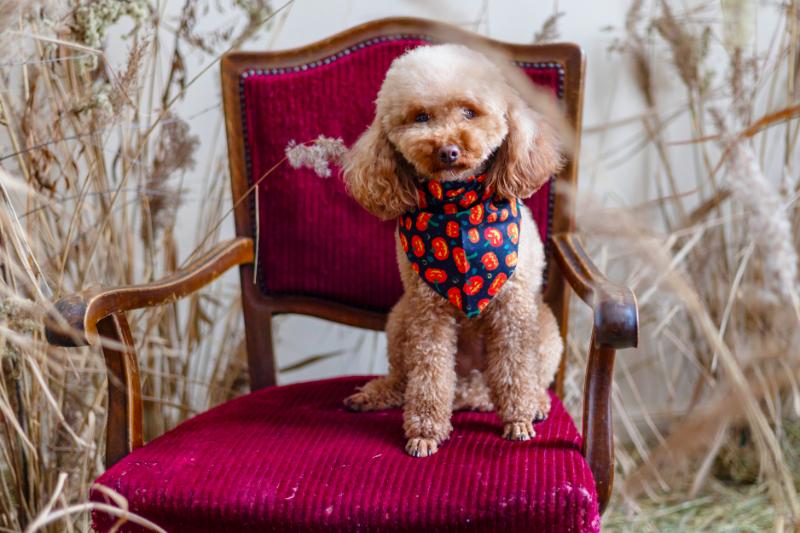
A Pocket Poodle, often called a Teacup Poodle, represents one of the smallest varieties within the Poodle breed. These miniature companions stand apart due to their less than four-pound weight and sub-nine inch stature at adulthood. Despite their diminutive size, these poodles exhibit the Poodle breed’s hallmark curly coat, prized for its hypoallergenic qualities.
The Pocket Poodle is renowned for its intelligence and trainability, mirroring the characteristics typical of the larger Poodle sizes. With a playful and affectionate nature, they make excellent companions well-suited for life as family pets. Owners often choose Pocket Poodles for their compact size, making them a convenient choice for smaller living spaces.
It should be noted that major kennel clubs do not officially recognize the Pocket Poodle as a separate size variation. Still, selective breeding practices developed an even smaller rendition of the Toy Poodle. Prospective owners should seek reputable breeders to ensure the health and well-being of these tiny canines.
Providing a balanced diet, ample exercise within their limits, and regular veterinary checkups is crucial for their well-being, as their small size can sometimes predispose them to health complications. Proper care will help prevent the onset of issues typically associated with smaller breeds, such as dental problems and fragile bones.
Let’s shed some light on the term ‘pocket’. It is a word frequently used when speaking about breeds of dogs, leading to misunderstandings for potential pet owners. Here, it is essential to make clear that a ‘pocket’ variety of any dog breed isn’t a different species. It’s a sub-category within a specific breed.
The term denotes that this dog is knowingly bred to be small. In the case of the Pocket Poodle, this involves choosing smaller male and female poodles to breed. The ultimate aim is to yield pups significantly smaller than the breed’s norm without sacrificing any of the endearing traits this breed offers.
Size and Appearance
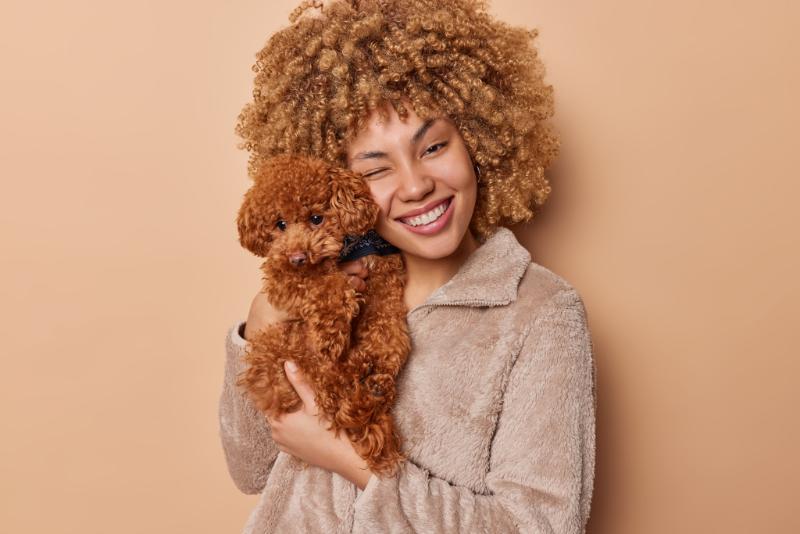
Pocket Poodles, often called Teacup Poodles, are the smallest classification within the Poodle family. They are a diminutive version of the Toy Poodle, distinguished not by official breed standards but by petite size.
Size:
- Height: They typically stand under 10 inches tall.
- Weight: These tiny canines generally weigh 4 to 6 pounds.
Coat and Colors:
- Texture: Pocket Poodles boast a curly, dense coat with low shedding.
- Variety: The coat comes in a spectrum of colors, such as white, apricot, gray, brown, and red.
- Maintenance: Regular grooming is required to maintain their hypoallergenic coat’s condition and to prevent matting.
Body Characteristics:
- Build: Pocket Poodles have a proportionate and sturdy body despite their size.
- Features: They exhibit the same elegant and athletic build as their larger Poodle counterparts.
These small canines need proper nutrition tailored to their diminutive stature for optimal health. Due to their size, they can be more prone to health issues such as dental problems and hypoglycemia; therefore, regular veterinary check-ups are essential. Engaging in gentle exercise is important to maintain their physical condition, though their energetic bursts should be balanced with adequate rest to avoid overexertion.
Temperament and Behavior
Poodles are energetic by nature. Therefore, your pocket-sized variety will need daily workouts to burn off their energy. This can range from indoor play to quick walks around the backyard. Mental stimulation is also key since these dogs are quite smart. Engage them with thoughtful games or let them fetch specific items by name.
Pocket Poodles, diminutive yet full of vigor, are akin to their larger Poodle counterparts in intelligence and disposition. Their loyal nature makes them excellent companions, attaching strongly to family members and often forging a particularly close bond with one individual. Despite their small size, they are quite playful and can thrive in an apartment setting as long as they receive daily exercise and mental stimulation.
Being smart dogs, Pocket Poodles are not only trainable but keenly enjoy the process. Training should incorporate positive reinforcement and consistency, which contributes significantly to their sociable attitude; this enables them to get along well with children and other pets, marking them as family-friendly. Their personality is characterized by affection and alertness, making them wonderful watchdogs despite their petite stature.
The temperament of a Pocket Poodle can be shaped significantly by their upbringing. Early socialization and exposure to various people and situations can help these dogs grow well-rounded. Regular mental challenges and opportunities for play reinforce positive behavior, while neglect of these needs may lead to undesirable behaviors.
- Health Tip: To maintain their psychological and physical well-being, regular check-ups with a vet are advised, along with a structured routine that includes exercise, training, and socialization.
- Care Tip: Given their size and active minds, Pocket Poodles are susceptible to feeling anxious if left alone for long periods. Prospective owners must ensure these dogs have company and enrichment throughout the day to prevent anxiety and boredom.
Food and Diet Requirements for Pocket Poodles
When considering the dietary needs of pocket poodles, owners should prioritize balanced nutrition that supports the health and vitality of these small breed dogs. Puppy pocket poodles are rapidly growing, thus necessitating diets rich in proteins and fats that support their development.
- Protein: The cornerstone of a pocket poodle’s diet, owners should seek out high-quality protein sources such as chicken, beef, duck, or fish.
- Fats: Essential for energy, look for dog foods that contain beneficial fats like Omega-3 and Omega-6 fatty acids.
- Carbohydrates: Whole grains and vegetables can offer this, providing fiber that aids digestion.
Adult pocket poodles require a well-formulated diet that maintains their energy levels and physique. Fat content should be adjusted based on weight and activity, ensuring they remain agile and not overweight.
Life Stage | Amount of Food |
|---|---|
Puppies | ½ to 4 cups daily |
Adults | 1 to 2½ cups daily |
Seniors | ½ to 3 cups daily |
Owners should always look for dog foods that meet the specific needs of their breed, size, and age. They must also ensure that the diet includes vitamins and minerals to complement the protein and fat. Regular monitoring and adjusting food intake are crucial, as pocket poodles may have a propensity for obesity due to overfeeding and inadequate exercise.
Lastly, while diet forms the core of health, toys can provide mental stimulation and physical activity. Choose toys that encourage active play and help maintain a healthy weight.
Exercise Needs
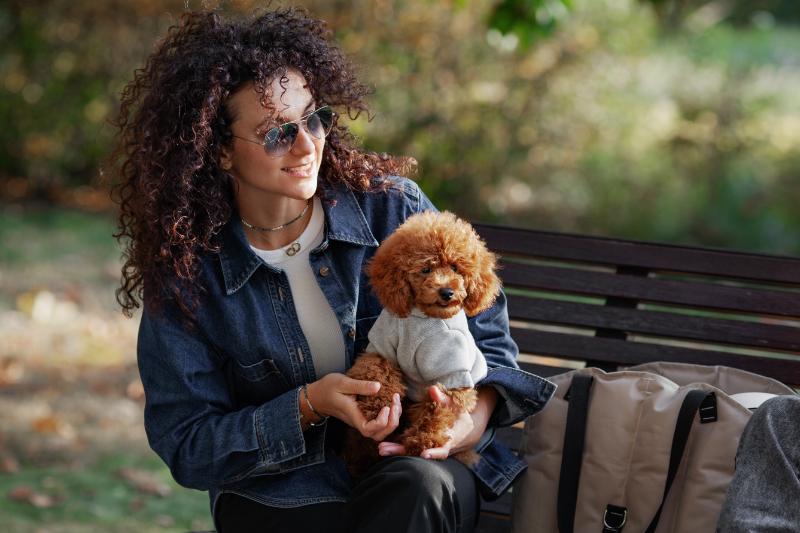
The Pocket Poodle isn’t just delightful because of its petite size. A considerable part of its appeal comes from the poodle’s splendid personality. Renowned for being intelligent and easy to train, they are a firm family favorite. Alongside their love of playtime and a natural inclination for affection, they are wonderful companions for humans.
Pocket Poodles are small but active dogs and require sufficient exercise to maintain their health and happiness. They indulge in bursts of energy that can be well-regulated with daily exercise routines.
- Daily Walks: At a minimum, it is recommended they engage in a 30-minute walk each day. Walking keeps the pet physically active and offers mental stimulation as they encounter various sights and smells.
- Agility Training: This breed is particularly suited to agility exercises due to their intelligent and spirited nature. Incorporating activities such as obstacle courses can support their mental and physical well-being.
- Play: Pocket Poodles are playful, and interactive play sessions contribute to their exercise quota while strengthening the bond between pet and owner.
- Customize to Their Lifestyle: Tailoring exercise to the individual dog’s energy and health levels is essential. While some pocket poodles may be satisfied with a few short walks, others may require more vigorous activities like extended playtime or agility challenges.
- Health Consideration: Consistent exercise routines cater to their physical needs and prevent problematic behaviors from boredom or excess energy.
Activity Type | Duration | Benefits |
|---|---|---|
Walks | 30 mins | Physical activity, exploration |
Agility | Variable | Mental stimulation, fitness |
Play | Variable | Bonding, energy management |
Training Tips
Keep in mind that poodles are sensitive animals. They can feel lonely if left alone for too long and be distressed by loud noises or harsh tones.
Pocket Poodles, a smaller variant of the Poodle breed, are renowned for their intelligence, which makes them highly receptive to training. When training a Pocket Poodle, it’s critical to start early to instill obedience and social skills. Consistency is key; routines help these canines understand what is expected of them.
Owners should integrate the following activities into their Pocket Poodle’s routine:
- Socialization: Introduce the puppy to various environments and people to build confidence and prevent social problems.
- Obedience Training: Focus on basic commands such as sit, stay, and come. Pocket Poodles grasp commands quickly due to their smart nature.
- Regular grooming sessions: Although not directly related to training, grooming enhances the bond between the dog and its owner and maintains the dog’s well-being.
When training, always opt for positive reinforcement. Rewards can be treats, praise, or playtime. The sensitive disposition of Poodles means they respond better to encouragement rather than harsh methods.
Age | Training Focus |
|---|---|
8-16 weeks | Housebreaking, socialization, basic commands |
17 weeks and onward | More complex commands, continued socialization |
Training should blend physical and mental stimulation, given that Pocket Poodles are energetic and inquisitive. Puzzle toys and interactive playtime can reduce potential behavioral problems by engaging their active minds.
Remember that every puppy is unique, and while Poodles are generally quick learners, patience is essential. If issues arise, seeking the assistance of a professional dog trainer might be beneficial.
Grooming Essentials
Pocket Poodles, often celebrated for their hypoallergenic coats, require consistent grooming to maintain their health and appearance. The fur of a Pocket Poodle is distinctively curly, necessitating routine care to prevent matting and tangles. Regular grooming sessions foster a clean coat, reducing the chance of skin irritations and allergies.
Daily Brushing
A daily brush with a gentle slicker brush is recommended to prevent tangles and remove debris. This practice is crucial for maintaining the dog’s luxurious coat, as the curls can easily trap dirt and particles.
Bathing Routine
Bathing a Pocket Poodle should not be excessive but done as necessary. Overbathing can strip the coat of its natural oils. High-quality dog shampoo and conditioner are advisable to preserve the coat’s condition and avoid allergic reactions.
Grooming Products
- Shampoo: Choose hypoallergenic options to protect sensitive skin.
- Conditioner: Select products designed for curly coats to enhance the fur’s natural texture.
- Comb: Utilize a wide-toothed comb for detangling after bathing.
Allergy Considerations
Owners should be attentive to any signs of allergies from grooming products or environmental irritants. Hypoallergenic grooming products are preferred to reduce potential reactions.
Professional Grooming
While owners can perform basic grooming at home, professional groomers can handle extensive grooming needs, including haircuts and ear cleaning, ensuring that Pocket Poodles retain their neat appearance without experiencing discomfort.
Health and Common Conditions
When discussing the health of pocket poodles, it’s critical to consider both genetics and the care provided. These small dogs may encounter several breed-specific health issues that owners should be vigilant about. Lifespan for poodles generally ranges from 12 to 15 years, dependent on overall health and genetics.
Eyes: Pocket poodles, like their larger counterparts, may develop eye conditions, so regular checks are essential. It’s important for owners to ensure their dog’s eyes are clear and to seek a vet’s advice if any changes occur.
Dental Health: Due to their small mouths, dental care is vital. Plaque buildup can lead to periodontal disease. Regular brushing and dental check-ups can aid in maintaining healthy teeth.
Genetic Conditions: Breed-specific problems like hip dysplasia and certain inherited eye diseases are less common but possible. Prospective owners should discuss the parent’s health with breeders and consider genetic screening.
Skin and Coat: Maintaining a pocket poodle’s coat requires regular grooming to prevent matting and detect skin issues early, such as sebaceous adenitis, which can lead to hair loss if not treated.
Choosing the Right Breeder
Selecting a reputable breeder when considering adding a pocket poodle to the family is crucial. A responsible breeder prioritizes the health and well-being of their puppies, offering transparency regarding their care and medical history. Prospective owners should look for breeders who provide comprehensive health screenings and clearances for puppies and their parents.
Health: Genetic testing helps mitigate the risk of inheritable conditions, ensuring the long-term health of the pocket poodle.
Care: Breeders should be willing to discuss the specific needs of pocket poodles, from grooming to dietary requirements. They must also follow up post-adoption to ensure the puppy adapts well to its new environment.
Choice: A trustworthy breeder will have vast knowledge about the poodle breed, from its history to the various breeds, including standard poodles, and can guide buyers in making an educated choice.
Poodle’s Family Background: Inquire about the puppy’s lineage to understand potential temperament and health implications.
Additionally, a visit to the breeder’s facility is important. Potential owners should observe the environment in which the puppies are raised:
- Is the setting clean and well-maintained?
- Do the puppies appear social and healthy?
- Are they being raised in a home environment and experiencing regular human interaction?
Your Pocket-Sized Friend: Care Tips
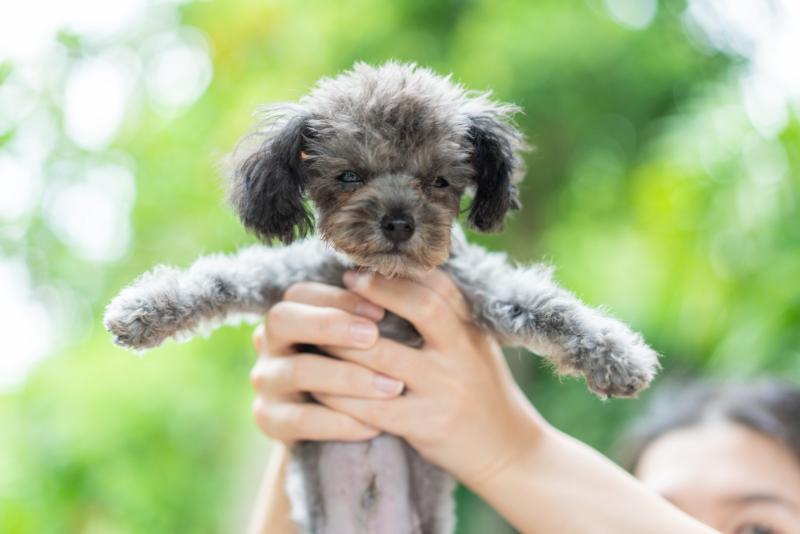
Taking care of a Pocket Poodle isn’t overly complex. Like other dogs, they require feeding, affection, grooming, and general care. However, due to their small size, their body structure demands extra care and protection.
Physical Fragility
While an average-sized poodle might freely jump on and off furniture, Pocket Poodles require more caution due to their delicate bone and muscular structure. So always ensure they aren’t leaping onto furniture or being handled roughly.
Interaction with Kids
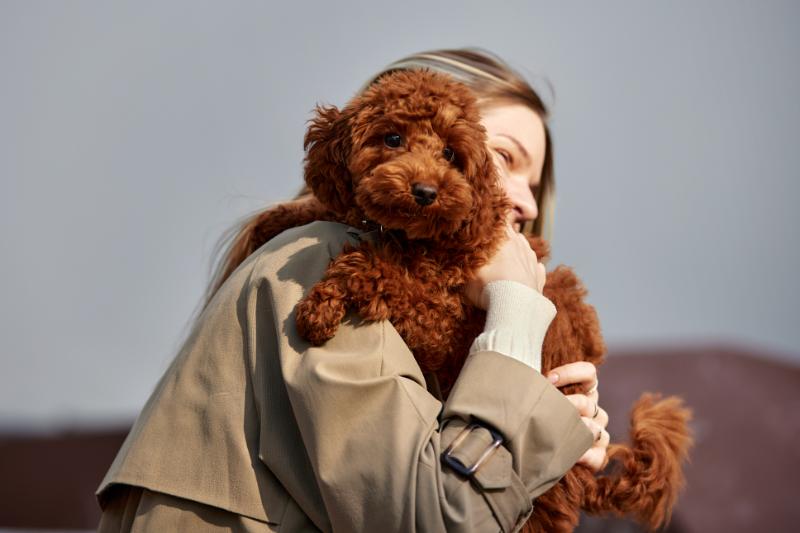
If your household includes small children who might not yet fully comprehend how to handle a small dog gently, you might want to consider another breed.
There you have it – all you need to know is whether a Pocket Poodle is the perfect, small-shaped bundle of joy to add to your family. This isn’t merely about having a cute, pint-sized pet but also appreciating the marvelous personality it brings into your life.
Frequently Asked Questions
How big does a pocket poodle get when fully grown?
A pocket poodle, also known as a teacup poodle, typically reaches a height of no more than 10 inches at the shoulder when fully grown. Due to their small size, it’s important for owners to handle them gently and protect them from injury.
What is the average lifespan of a toy poodle?
The average lifespan of a toy poodle ranges from 12 to 15 years. Consistent, quality veterinary care and a well-balanced diet contribute to their longevity.
What are the common health concerns for teacup poodles?
Teacup poodles can be prone to various health issues, such as hypoglycemia, respiratory problems, and dental issues due to their diminutive size. Regular check-ups with a veterinarian are essential to monitor and maintain their health.
At what age is a toy poodle puppy considered full-grown?
A toy poodle puppy is typically considered full-grown at around 6 to 7 months of age. They should have a nutrient-rich diet and proper socialization during their growth period to ensure a well-adjusted adult dog.